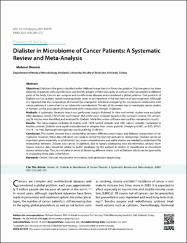| dc.contributor.author | Demirci, Mehmet | |
| dc.date.accessioned | 2021-12-12T17:00:45Z | |
| dc.date.available | 2021-12-12T17:00:45Z | |
| dc.date.issued | 2021 | |
| dc.identifier.issn | 2587-196X | |
| dc.identifier.uri | https://doi.org/10.14744/ejmo.2021.65073 | |
| dc.identifier.uri | https://hdl.handle.net/20.500.11857/2888 | |
| dc.description.abstract | Objectives: Dialister is the genus classified within Veillonellaceae family in Firmicutes phylum. Dialister genus has been detected in patients with oral infections and healthy people in their oral cavity, as well as in clinical samples in different parts of the body. Cancers are complex and multifactorial diseases and considered a global problem. End products of Dialister such as acetate, lactate and propionate seem to be important in the mechanism of carcinogenesis. Although it is reported that the composition of Dialister has changed in articles investigating the microbiome relationship with cancer patients, it is seen that it is not taken into consideration.The aim of this review was to investigate cancer studies in humans on the association of microbiome with composition changes in Dialister. Methods: A systematic literature search was performed using in Pubmed. In vitro and animal studies were excluded. After database search, 510 articles were found. 484 article were excluded based on the exclusion criteria. The remaining 26 articles were identified and analysed for Dialister. Meta-Mar online software was used for metaanalysis results. Results: The meta-analysis included 26 studies with 1649 control samples and 1961 cancer samples. Compared to healthy controls, Dialister were significantly elevated in samples from cancer patients (Hedges'g=0.907, p<0.05, 95%CI [13.19 - 16.746]. Statistical heterogeneity was found hihg (I-2=99.6%). Conclusion: This review showed that a relationship between different cancer types and Dialister composition of microbiome. however, these data still seem very weak to reveal the Dialister and cancer relationship. Dialister can be an important genus especially in solid tumors but, more comprehensive and wider studies are needed to understand the relationship between Dialister and cancer. In addition, due to rapidly developing new bioinformatics analysis techniques, massive data should be added to public databases by the authors in studies of microbiome or microbiota disease relationship.Thus, it is valuable in terms of detecting different strains such as Dialister, which can be ignored by re-evaluating these data in the future. | en_US |
| dc.language.iso | eng | en_US |
| dc.publisher | Kare Publ | en_US |
| dc.relation.ispartof | Eurasian Journal of Medicine and Oncology | en_US |
| dc.identifier.doi | 10.14744/ejmo.2021.65073 | |
| dc.rights | info:eu-repo/semantics/openAccess | en_US |
| dc.subject | Cancer | en_US |
| dc.subject | Dialister | en_US |
| dc.subject | microbiome | en_US |
| dc.subject | microbiota | en_US |
| dc.subject | next generation sequencing | en_US |
| dc.title | Dialister in Microbiome of Cancer Patients: A Systematic Review and Meta-Analysis | en_US |
| dc.type | review | |
| dc.authorid | Demirci, Mehmet/0000-0001-9670-2426 | |
| dc.department | Fakülteler, Tıp Fakültesi, Temel Tıp Bilimleri, Tıbbi Mikrobiyoloji Ana Bilim Dalı | |
| dc.identifier.volume | 5 | en_US |
| dc.identifier.startpage | 260 | en_US |
| dc.identifier.issue | 3 | en_US |
| dc.identifier.endpage | 272 | en_US |
| dc.relation.publicationcategory | Diğer | en_US |
| dc.authorscopusid | 57220204043 | |
| dc.identifier.wos | WOS:000703452600009 | en_US |
| dc.identifier.scopus | 2-s2.0-85117168639 | en_US |
| dc.institutionauthor | Demirci, Mehmet | |
| dc.authorwosid | Demirci, Mehmet/O-1886-2015 | |



















